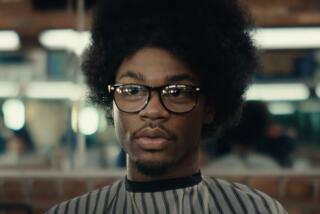Seduced by a juicy burger
- Share via
When I watch the Carl’s Jr. commercial featuring “Top Chef” host and mega-model Padma Lakshmi make hot sweet love to a Western Bacon Cheeseburger, I have many thoughts, some of which, I confess, are not entirely to my credit. The spot features the former Mrs. Salman Rushdie sitting on a brownstone stoop in a clingy sundress hiked up mid-thigh, cramming the giant burger into her educated maw and sucking barbecue sauce from her fingers and wrists. Let’s not mince onions here: This is sex with a burger.
You might think that here, at last, television advertising might have crossed some sort of debauched Rubicon, or at least some tripwire at the Federal Communications Commission. Not even close. It’s merely the latest chapter in the weird mash-up between sex and diabolically unhealthful fast food.
What gives?
If my cultural antenna doesn’t fail me, the mood of the country is slightly more relaxed about sexual matters. Global economic crisis tends to put provincialism on the back burner.
Not only that, fast food has a huge image problem. This is the bottom rung of America’s food chain. Prescribed use of fast food makes you undesirable. The Western Bacon Cheeseburger from Carl’s Jr., for instance, has 720 calories, 33 grams of fat and 1,410 milligrams of sodium, a veritable pillar of biblical salt.
The Carl’s Jr. commercial, from Mendelsohn Zien Advertising in Los Angeles, is in heavy rotation this month with a duplicate for corporate cousin Hardee’s that’s running in Eastern markets. The ads reunite Mendelsohn Zien and director Chris Applebaum, who created the 2005 commercial with a nearly naked Paris Hilton lathering up a Bentley. Applebaum also directed the 2007 campaign for Carl’s Jr. flat-bun burgers, featuring a hip-hop duo serenading their high school teacher’s flat butt -- her badonkadon’t, if you will.
All future correspondence to Mendelsohn Zien and Applebaum should be addressed to the Eighth Circle of Hell.
I cannot pretend to be offended by these ads. Young men are coarse, callow, emotional imbeciles with suicidal dietary habits. In other words, from a marketing perspective, these ads are perfection itself, practically verite. Meanwhile, if I put on my magic deconstructing spectacles, I can see neo-feminist subversion in these messages. Note the tagline of the Padma Lakshmi commercial: “More than a piece of meat.” This was the cri de coeur of feminism back in the day, and though it refers to the burger, it is also a tweak of conscience to males slobbering over the accomplished actress-author-chef. Take that, you objectifying pig.
Also, in a culture in which glamour and beauty have been so thoroughly yoked to anorexia, isn’t it great to see a sexy woman eat like a stevedore?
So, good for Carl’s Jr. Its advertising has found its voice, its groove, its gimmick. It has a style in which the male is both hero and buffoon. The trouble arises as other fast-food outfits attempt to rise, or sink, to Carl’s Jr.’s new standard of loutishness. Consider the new Quiznos ad for Toasty Torpedo sandwiches (Nitro). This one’s a little hard to describe but it appears that Scott, a Quiznos baker, has had some kind of dangerous liaison with the oven, which speaks to him: “Scott, I want you to do something,” the oven says in a husky male voice. “I’m not gonna do that again,” Scott says. “That burned.” “We both enjoyed that,” the oven answers.
The oven then demands that Scott make a foot-long Toasty Torpedo and -- I quote -- “Put it in me, Scott.”
Umm, check please, waiter.
Not to be left out, Burger King drew fire this month for its oddly sexualized ad promoting its 99-cent SpongeBob SquarePants Kids Meal (Crispin Porter + Bogusky), which involves the King riffing to Sir Mix-a-Lot’s “Baby Got Back” while a bunch of orthogonally rumped hotties dance around. The King likes square butts, apparently.
“It’s bad enough when companies use a beloved media character like SpongeBob to promote junk food to children, but it’s utterly reprehensible when that character simultaneously promotes objectified, sexualized images of women,” fumed Susan Linn, the director of Campaign for a Commercial-Free Childhood.
Any minute now, Ronald McDonald is going to mount a stripper pole.
Sex and fast food. Theories, anyone? For one thing, these ads target a young audience, digital natives who have had their normative values defined by life online, which is generally pretty risque (I have no doubt there is a man-on-toaster website out there). For another, humor is about the only defense advertisers have against the commercial-skipping fast-forward button on the DVR. And sex is, on a cosmic level, pretty hilarious.
But mainly, fast-food advertisers know their products are singularly, dangerously unsexy. Quiznos’ Tuna Melt (large), at 2,090 calories, was just voted Worst Sandwich in America by Men’s Health. If you eat a lot of those, you’ll get fat and smell strange, and nobody will want to have sex with you.
The sexualization of fast food takes us down the same path of old cigarette advertising that showed doctors, athletes and cowboys smoking like crazy and living active, aerobically challenging lives; or beer commercials, in which everybody is as sleek as ferrets. These products have definite, measurable health consequences, and it’s the job of the advertising’s imagery to push these consequences as far offstage as possible.
And so you have the impossibly lean and beautiful Lakshmi wolfing down a 1,000-calorie burger. Now that’s hard to swallow.
--
More to Read
Eat your way across L.A.
Get our weekly Tasting Notes newsletter for reviews, news and more.
You may occasionally receive promotional content from the Los Angeles Times.










